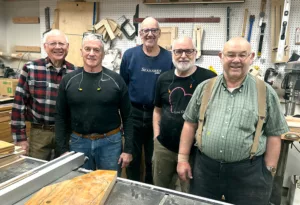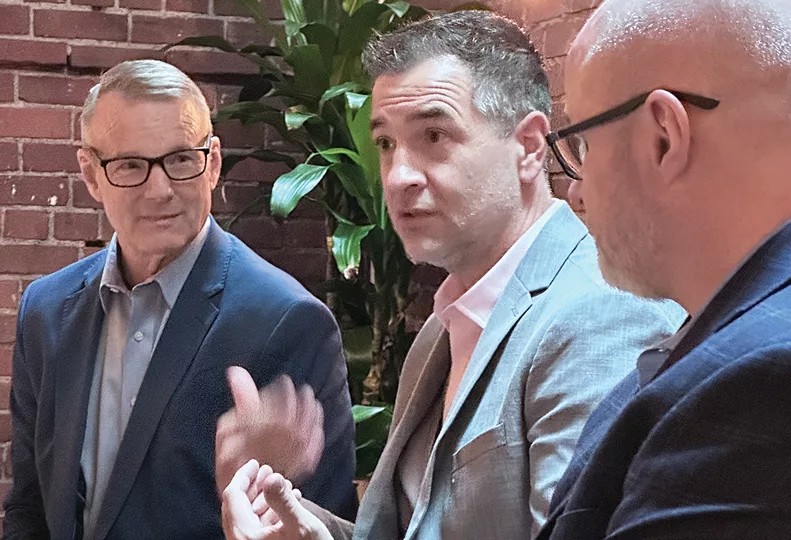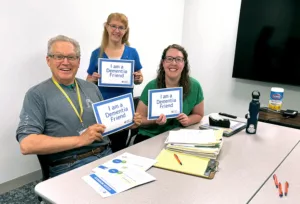
Greater Spokane Incorporated launches In Schools campaign
Organization endeavors to unite business leaders, superintendents

Greater Spokane Incorporated leadership advisory council member Chris McFaul, left; Spokane Public Schools Superintendent Adam Swinyard, center; and East Valley School District Superintendent Brian Talbott meet at an In Schools' featured dinner.
| Erin VincentGreater Spokane Incorporated hopes to bridge a gap of misinformation between communities and schools with the formation of a campaign called In Schools.
Launched in January, GSI’s In Schools initiative is dedicated to showcasing inspiring stories and educating the community about key concepts, including school finances, property taxes, and investments in education, says Erin Vincent, GSI’s vice president of education and talent.
“GSI is laser focused on creating conditions for economic prosperity, and K-12 education is at the very heart of that work,” says Vincent. “This is how we can develop and provide opportunities for success for our students, for our kids… we want to do everything we can to see them thrive and stay (in Spokane) if they can.”
The five-year In School’s campaign goal is to raise $1 million, says Lisa Poplawski Lewis, executive vice president of development and strategic communications. GSI has reached its halfway point in contributions and pledges.
Money raised will go toward workshops, building resources on the website, and public events. These resources will serve as a "hub of information," Vincent says.
“We would like to be a part of clearing up some of those big questions,” she says. “If somebody has a question about how school districts spend money, we want to make it easy for people to get answers.”
So far, funding and partnerships have formed between 12 school districts and 12 local business, including Bank of America, Liberty Lake-based STCU, and Coffman Engineers.
For the first time in nearly 50 years, a Spokane Public Schools' bond failed to meet the 60% supermajority required to pass in the February 2024 elections.
Levy support for local school districts in 2024 was enough for a simple majority but dropped in comparison to previous years.
For example, in the 2018 elections, Central Valley School District’s levy passed with a 71% supermajority. In 2024, it received only 53% approval.
CVSD Superintendent John Parker hopes the campaign will bring attention to schools on a continuous basis, not just during election seasons.
“It’s an opportunity for schools and businesses to come together and find common ground to support schools,” Parker says. “And not just during the years where schools are running levies, but all the time… building that broad brush stroke of support on an ongoing basis.”
In January, GSI held the Inland Northwest’s inaugural State of Education, an event that brought together a panel of K-12 superintendents to explore the future of learning. The school leaders provided perspectives on the current state and future direction of public education.
The panel, led by Spokane Public Schools Superintendent Adam Swinyard, answered questions from a sold-out crowd at DoubleTree by Hilton Spokane City Center.
Parker, a member of the panel, says the key to such events is bringing together the community, businesses, parents, and school leaders on a united front.
“We’re better together,” Parker says.
As a result, the community will be more supportive when it comes time to ask for a levy or a bond because they will understand the vital role that schools play in the process of kid’s maturation into the workforce and giving back to the community, Parker says.
“It’s a very intertwined system,” he says. “And we’re really trying to capitalize on that.”
Since launching in January, GSI has already held multiple gatherings between school leaders and members of the business community.
GSI recently hosted a group of school directors from CVSD’s Early Learning Program, says Parker.
“Jointly together, we painted a picture of the importance of early literacy,” he says. “It allowed individuals from our business community to ask questions and understand the important aspects of early learning on K-12 education.”
Another way GSI is bridging the gap is with small, intimate dinners at local restaurants.
A select group of school leaders and members of the community, between 10 to 12, meet at local restaurants and have discussions. The most recent event was held downtown at Wooden City Spokane and included multiple superintendents and leaders from the business community. Dinners planned for the future include the West Plains, Spokane Valley, and North Side, says Vincent.
Parker says the dinners give schools a chance to “pull back the curtain” as far as what’s important in K-12 education.
“We get around a table, we break bread, we talk a lot about education, and we give our business and community partners an opportunity to ask us questions about schools,” adds Parker. “It’s a chance to have those grassroots conversations … and allow good questions to be asked and better answers to be provided."
Parker says the failure of recent bonds is evidence that the schools need to rethink their strategies.
“We need a strategy that’s broader, more long term, and lasting ... one that is utilizing advocacy in a much deeper context and in a context that reignites excitement and purpose from our community for our public schools,” he says.
The long-term goals of the campaign not only include building a network of business advocates for schools, but GSI will also develop a research bank to better represent bonds and levies, says Vincent.





